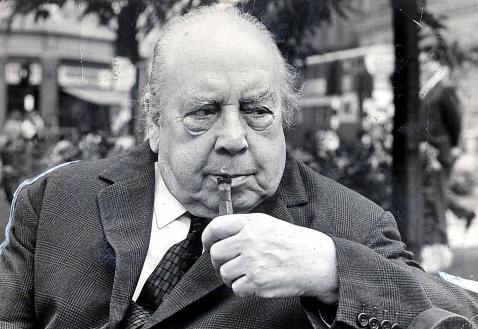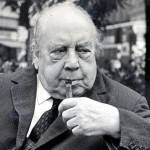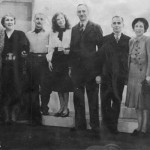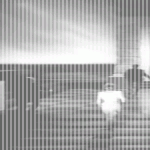8 July: Angie Gee, Hippolyta to my Theseus in Midsummer Night’s Dream, has been promising to direct this JB Priestley work for some while, having once played the role of Alice “when I was young” and having been blown away by the play. Whether the audience gets it remains to be seen, but the work is far more beguiling than it first sounds:
A diverse group of English people, conveniently representing most sections of postwar English society, arrive outside the walls of a strange city without the foggiest idea how they got there. Their initial exchanges demonstrate the stratified nature of a society still ridden by social class and nouveau riche as well as the poverty of the ancien-pauvre. In Act 2, they get to enter the city, a New Jerusalem in all but name and masterpiece of the socialist ideal of social welfare and common humanity. They react to it in predictably different ways, and eventually depart, some changed by the experience and others tempted to stay.
One interpretation is that they are all dead and in some kind of intermediary neverland along the lines of the Pacific island in the TV series Lost – or maybe even the Garden of Eden from Milton’s Paradise Lost. However, JBP himself summarised it simply as an analysis of attitudes in post-war society. There may well be other interpretations, we shall see.
Undeniably TCtaC is a total contrast from Shakespeare, and the roles will make sure nobody feels typecast. The role I was most attracted to and was awarded, Joe Dinmore, is equally as far from Oberon and Theseus as one could imagine. Joe is a working class guy with attitude. He has been everywhere and done everything. His revolutionary zeal and ideals have been dashed, leaving him sardonic and cynical in a cool and stylish way. He is not intimidated by anybody, nor does he have any chips on his shoulder, but the city presents him with a new challenge: how to find people to share in the desire for dreamed cities and to achieve their own.
Well, rehearsals begin next week (or whenever Angie completes casting), so watch out for further developments.
10 Oct: This is show week, and the show will indeed go on, as it must. In truth this has been a slightly odd play to rehearse, not least because we’ve barely ever had a full cast on stage at the same time until this week for dress rehearsals. There have been a few strained moments along the way and moments when it didn’t look like happening at all, but it is getting there gradually, as shows always do.
I’ve got my words and have barely looked at the book in weeks. It’s all “embrained” as they say in KM circles, and friends now tell me I am unwittingly talking and walking and behaving like Joe all the time. It’s a bit strange when a character gets under your skin – more like them inhabiting you than you inhabiting them.
Our characters are all there, the skill being to make them come to life and interact as they would interact. The danger is that they are cardboard cutouts, stereotypes written by Priestley to represent ideologies at large in post-war Britain. As a play it’s as far removed from Midsummer Night’s Dream as it’s possible to get. It has a few laughs, but not that many. It is filled with social demagoguery of varying sorts, with each character having their own mini-monologue.
My character does, as he admits, talk too much – but it’s worth it for the impassioned speech at the end, filled with revolutionary fervour:
“Until you begin to realise that there are millions of us. Yeah, armies and armies of us. Enough to build ten thousand new cities.”
The environment in which these interactions take place is akin to a castle wall with a huge golden door, and a wall like ramparts. It differed from how I imagined it, in that the walkway platform is much lower than expected (one step rather than the five steps envisaged by Priestley.) The lights are still a work in progress (they start at dawn and finish at dusk, so movement up and down is essential), and our debutant prompt is still learning the trade, bless her, but come first night it should be a great show.
18 Oct: Well, another show comes and goes. Think we are agreed that the first night was not the finest, perhaps evidence of a touch of nerves among the cast, but things improved. I don’t believe we reached the level of perfection to which we aspire, but the critic’s review took us off to places beyond the capability of this production:
The Came to a City, Phoenix Players
Performed Oct 12, 2012 at Christchurch, Chelmsford
Director – Angela Gee
This rarely performed play by J.B. Priestley, written in 1943 at the height of World War II, shines its less-than-subtle satirical spotlight on capitalism and the class system. Since the social mix of characters was rather more skewed towards the aristocratic in a way we wouldn’t see as realistic today I wonder whether some tinkering with the script would have updated the look and feel of the piece. Although the sentiments expressed are theoretically timeless there were several characters that didn’t sit well with the way we look at society today. The production was also hampered somewhat by the, no-doubt pragmatic, choice of Jean Speller and Andy Millward as Alice Foster and Joe Dinmore respectively. They both did an excellent job, had some of the best dialogue and created real tension and emotion between them. However, they did not have youth on their side which I suspect was essential to create maximum audience empathy for this couple. Without the impetuosity and idealism of youth some of the characterisation could be interpreted as simply envy and morosity that is more looking back at a wasted past than eagerly awaiting a triumphant future. I haven’t seen the play before but suspect that sympathy for Joe and Alice is the crux of the play. They are the couple that rise above their desire for personal happiness in the mysterious City in order to spread the news elsewhere.
The set was a truly timeless juxtaposition of city walls or battlements and a large golden door and yet the costumes firmly placed the action in the 1940s. Would modern dress have worked, with Cudworth in a loud suit and red braces; Lady Loxfield played more as a widowed social-climbing trophy wife and her daughter a gum-chewing NEET desperately seeking a worthwhile idea to cling to? Maybe, maybe not but as a period piece it was harder to translate the ideas expressed to today despite the fact that they remain very relevant. Nevertheless I enjoyed this production which was extremely thought-provoking and showcased some good acting skills, particularly from Helen Langley as Mrs Batley, whose apparent acceptance of her harsh lot in life evoked considerable sympathy.
Congratulations for reviving a little seen play and giving it a thorough airing. I do understand the constraints of casting and acknowledge that within those constraints They Came to a City was well done. I look forward to the next production.
Reviewer – Stewart Adkins NODA East, District 8
Well, I can’t do anything about my lack of youth, but I will take “excellent” with gratitude!
Michael Grey’s review:
Phoenix Theatre Company at Christ Church12.10.12Social Justice is not a fashionable concept these days, but in the darkest years of the last war, our greatest writers were keen to visualize what utopia might rise from the ashes.In Priestley’s intriguing period piece, nine characters from all ranks of 1940s society, with their jealousies, frustrations and disappointments, are shown a shining city; they may choose to stay or return to their earthly lives. The capitalist and the aristocrat are amongst those who leave, the char and the heiress amongst those who remain.In Angela Gee’s production, the nobility were less convincing generally than the plebs. Fine character work from Syd Smith and Tricia Childs as a henpecked banker and his domineering wife, and from Helen Langley as the salt-of-the-earth char.What Priestley is advocating, of course, is that we take the vision of the city where “men don’t work for machines and money” back to our imperfect world, building a new Jerusalem in place of the dark Satanic mills. And it is left to mechanic Joe [well portrayed by Andy Millward] and shopgirl Alice [the Googie Withers role excellently done by Jean Speller] to leave us on that optimistic note.But despite the NHS and the Welfare State and Comprehensive Education, I suspect that, seventy years on, Joe and Alice have still much work to do to make Whitman’s Great City a reality.





It was a very enjoyable play. Although I will be pleased to see the skinhead unshaven Joe disappear. You and the cast put on a very believable and entertaining play. xx Who will you be next ?????????
I have really learned some new things from a blog post. Yet another thing to I have noticed is that generally, FSBO sellers are going to reject you. Remember, they can prefer not to ever use your services. But if a person maintain a stable, professional romance, offering help and remaining in contact for four to five weeks, you will usually have the capacity to win a business interview. From there, a listing follows. Cheers